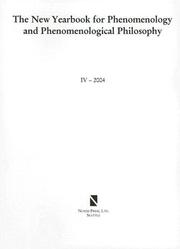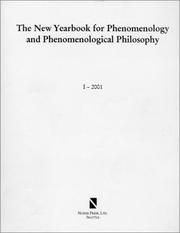| Listing 1 - 10 of 10 |
Sort by
|
Book
ISBN: 9783495487525 3495487522 Year: 2015 Publisher: Freibourg: Karl Alber,
Abstract | Keywords | Export | Availability | Bookmark
 Loading...
Loading...Choose an application
- Reference Manager
- EndNote
- RefWorks (Direct export to RefWorks)
Das Buch intendiert eine Klärung der prinzipiellen Grundlagen für einen existentiell wie gesellschaftlich immer wichtiger werdenden Erfahrungsbereich, wie ihn die Begegnung zwischen Patient und Therapeut darstellt, um sowohl aus tiefenpsychologischer wie phänomenologischer Perspektive nach der "Wirklichkeit" einer solchen Beziehung zu fragen. Der Haupttitel "Begehren und Sinn" verweist dabei auf eine doppelte Struktur, die in der bisherigen Tradition auch mit Trieb und Existenz bezeichnet wurde, aber letztlich auf einen gemeinsamen Ursprung zurückverweist, der als rein subjektives, intensives wie pathisches Leben bezeichnet wird. Damit ist eine radikale Einheit der Leiblichkeit gekennzeichnet, die sich in die Welt als Sinn oder Intentionalität hinein entwirft, aber dies vor-ontologisch nicht vermöchte, ohne an eine lebendige Bewegung zurückgebunden zu sein, welche das Begehren darstellt. In diesem Begriff findet sich auch die neo-psychoanalytische Weiterführung Freuds durch Lacan mit den entsprechenden meta-psychologischen Auseinandersetzungen angedeutet, so wie der Sinnbegriff hauptsächlich auf Beschreibungen Husserls und Ricoeurs im Zusammenhang mit Daseins- und Existenzanalyse (Binswanger, Frankl) rekursiert, wobei ebenfalls der Beitrag von Heidegger und Michel Henry durchgehend gewürdigt wird. Methodische und technische Fragen zum therapeutischen Prozess werden so in einen größeren Zusammenhang gestellt und schulübergreifend nachvollziehbar.
Phenomenological psychology --- Psychotherapy --- Psychoanalysis

ISBN: 1315681862 131740145X 1317401441 9781317401452 9780970167941 Year: 2015 Publisher: London New York
Abstract | Keywords | Export | Availability | Bookmark
 Loading...
Loading...Choose an application
- Reference Manager
- EndNote
- RefWorks (Direct export to RefWorks)
Phenomenology. --- Philosophy. --- Phenomenological psychology.
Book
ISBN: 9781315681801 9780984389001 Year: 2015 Publisher: London Routledge
Abstract | Keywords | Export | Availability | Bookmark
 Loading...
Loading...Choose an application
- Reference Manager
- EndNote
- RefWorks (Direct export to RefWorks)
Book
ISBN: 0415739136 9780415739139 Year: 2015 Publisher: New York: Routledge,
Abstract | Keywords | Export | Availability | Bookmark
 Loading...
Loading...Choose an application
- Reference Manager
- EndNote
- RefWorks (Direct export to RefWorks)
"Necessary Conditions of Learning presents a research approach (phenomenography) and a theory (the variation theory of learning) introduced and developed by Ference Marton and taken up by his wide and varied following around the world--together with their practical applications in educational contexts. Reflecting Marton's whole lifetime's work, the unique and significant contribution of this book is to offer an evidence-based answer to the questions "How do we make novel meanings our own?" and "How do we learn to see things in more powerful ways?" The presentation makes use of hundreds of empirical studies carried out in Europe and Asia which build on the theory. The line of reasoning and the way in which the examples are put together is consistent with the theory--it is both presented and applied. The main argument is that in order to learn we have to discern, and to discern the intended ideas we must be presented with carefully structured variation, against a background of invariance. We then go through processes of contrast, generalization, and fusion in order to make sense. These insights form a practical framework for those who design teaching and teaching materials. Necessary Conditions of Learning is a major original work for which scholars of pedagogical theory have been waiting a long time"
Book
ISBN: 1489906312 9781489906311 Year: 2015 Publisher: New York: Springer Science+Business Media,
Abstract | Keywords | Export | Availability | Bookmark
 Loading...
Loading...Choose an application
- Reference Manager
- EndNote
- RefWorks (Direct export to RefWorks)
Consciousness --- Self-report inventories --- Phenomenological psychology --- Consciousness --- Psychometrics
Book
ISBN: 9782343049755 Year: 2015 Publisher: Paris : L'Harmattan,
Abstract | Keywords | Export | Availability | Bookmark
 Loading...
Loading...Choose an application
- Reference Manager
- EndNote
- RefWorks (Direct export to RefWorks)
Un siècle après Ideen de Husserl, l'auteur, médecin psychiatre interroge la phénoménologie. Il retrace son avènement, son héritage, ses engouements, ses dérapages et ses espoirs à travers un certain nombre de figures qui ont marqué son histoire tels que M. Heidegger, J.-P. Sartre ou le médecin psychiatre H. Ey.
Phenomenology. --- Phenomenological psychology. --- Phénoménologie --- Psychologie phénoménologique

ISBN: 131740159X 1315681919 1317401603 9781317401605 9780970167910 9781315681917 9781317401582 9781317401599 Year: 2015 Publisher: London ; New York : Routledge,
Abstract | Keywords | Export | Availability | Bookmark
 Loading...
Loading...Choose an application
- Reference Manager
- EndNote
- RefWorks (Direct export to RefWorks)
The New Yearbook for Phenomenology and Phenomenological Philosophy
Phenomenological psychology --- Phenomenology --- Psychological phenomenology --- Psychology, Phenomenological --- Existential psychology --- Personality --- Psychology
Book
ISBN: 0191792977 0191038857 9780191038853 9780198725978 0191038865 0198725973 Year: 2015 Publisher: New York, New York : Oxford University Press,
Abstract | Keywords | Export | Availability | Bookmark
 Loading...
Loading...Choose an application
- Reference Manager
- EndNote
- RefWorks (Direct export to RefWorks)
Psychiatry has long struggled with the nature of its diagnoses. The problems raised by questions about the nature of psychiatric illness are particularly fascinating because they sit at the intersection of philosophy, empirical psychiatric/psychological research, measurement theory, historical tradition and policy. In being the only medical specialty that diagnoses and treats mental illness, psychiatry has been subject to major changes in the last 150 years. This book explores the forces that have shaped these changes and especially how substantial ""internal"" advances in our knowledge of the
Phenomenological psychology. --- Psychiatry --- Psychological phenomenology --- Psychology, Phenomenological --- Existential psychology --- Personality --- Phenomenology --- Psychology --- Philosophy. --- History --- Philosophy --- Psychiatry - History --- Psychiatry - Philosophy
Book
ISBN: 9783319103259 9783319103266 9783319103273 9783319385051 3319103253 3319103261 Year: 2015 Volume: 216 Publisher: Dordrecht Springer
Abstract | Keywords | Export | Availability | Bookmark
 Loading...
Loading...Choose an application
- Reference Manager
- EndNote
- RefWorks (Direct export to RefWorks)
This volume explores the role and status of phenomena such as feelings, values, willing, and action in the domain of perception and (social) cognition, as well as the way in which they are related. In its exploration, the book takes Husserl’s lifelong project Studien zur Struktur des Bewusstseins (1909-1930) as its point of departure, and investigates these phenomena with Husserl but also beyond Husserl. Divided into two parts, the volume brings together essays that address the topics from different phenomenological, philosophical, and psychological perspectives. They discuss Husserl’s position in dialogue with historical and recent philosophical and psychological debates and develop phenomenological accounts and descriptions with the help of Geiger, Heidegger, Merleau-Ponty, Plessner, Sartre, Scheler, Schopenhauer, and Reinach.
Philosophical anthropology --- Cognitive psychology --- Theory of knowledge --- Phenomenological psychology --- Husserl, Edmund, --- Phenomenology . --- Modern philosophy. --- Cognitive psychology. --- Phenomenology. --- Modern Philosophy. --- Cognitive Psychology. --- Academic collection --- Psychology, Cognitive --- Cognitive science --- Psychology --- Modern philosophy --- Philosophy, Modern
Book
ISSN: 09239545 ISBN: 9783319103235 3319103229 9783319103228 3319103237 Year: 2015 Volume: 75 Publisher: Dordrecht Springer
Abstract | Keywords | Export | Availability | Bookmark
 Loading...
Loading...Choose an application
- Reference Manager
- EndNote
- RefWorks (Direct export to RefWorks)
This book provides a critical introduction to Heidegger’s impact on psychiatry and psychology, and has a focus on the application of his philosophy to psychiatry. This is a complete revision of Heidegger’s existential philosophy in the light of psychopathological phenomena. Readers will find here a philosophical inquiry into the problem of mental disorder, which shows Heidegger’s own philosophy in a new light, uncovering both its strengths and its weak points. The author maps not only Heidegger’s interaction with psychiatric thought, as depicted in his Zollikon Seminars, but also his influence on Swiss phenomenological psychiatry. The work treats Heidegger in a critical way, taking the phenomenon of mental disorder as a touchstone on which Heidegger’s thought is tested. The results of such a critical examination are important, not only for a better understanding of psychopathological phenomena, but also for a new understanding of Heidegger’s approach to human existence. This work treats the phenomenon of mental disorder as a philosophical problem that reflects the ontological character of human existence. Heidegger’s approach to mental disorder is confronted with the conceptions of Foucault, Deleuze and Guattari in a novel way. The book is more than just an historical overview as it highlights the limits of phenomenological thought in the area of psychiatry and it shows a possible way of moving beyond them. This is a philosophical work with an interdisciplinary range. Scholars of philosophy and those in the growing field of philosophy of psychiatry, as well as those with an interest in Heidegger Studies will be particularly interested in this work.
Philosophy. --- Phenomenology. --- Clinical Psychology. --- Psychiatry. --- Philosophy (General). --- Psychology, clinical. --- Phénoménologie --- Psychiatrie --- Philosophy (General) --- Phenomenology --- Psychiatry --- Psychology, clinical --- Phenomenological psychology. --- Psychology, Pathological. --- Abnormal psychology --- Diseases, Mental --- Mental diseases --- Mental disorders --- Pathological psychology --- Psychology, Abnormal --- Psychopathology --- Neurology --- Brain --- Criminal psychology --- Mental health --- Psychoanalysis --- Psychological phenomenology --- Psychology, Phenomenological --- Existential psychology --- Personality --- Psychology --- Diseases --- Heidegger, Martin, --- Khaĭdegger, Martin, --- Haĭdegger, Martin, --- Hīdajar, Mārtin, --- Hai-te-ko, --- Haidegŏ, --- Chaitenger, Martinos, --- Chaitenker, Martinos, --- Chaintenger, Martin, --- Khaĭdeger, Martin, --- Hai-te-ko-erh, --- Haideger, Marṭinn, --- Heidegger, M. --- Haideger, Martin, --- Hajdeger, Martin, --- הייגדר, מרתין --- היידגר, מרטין --- היידגר, מרטין, --- 海德格尔, --- Chaintenker, Martin, --- Criticism and interpretation. --- Philosophy & Religion --- Philosophy --- Clinical psychology. --- Phenomenology . --- Medicine and psychology --- Psychology, Pathological --- Philosophy, Modern --- Hāydigir, Mārtīn, --- Hīdigir, Mārtīn, --- هاىدگر, مارتين, --- هىدگر, مارتين, --- Psychology, Applied --- Psychological tests
| Listing 1 - 10 of 10 |
Sort by
|

 Search
Search Feedback
Feedback About UniCat
About UniCat  Help
Help News
News